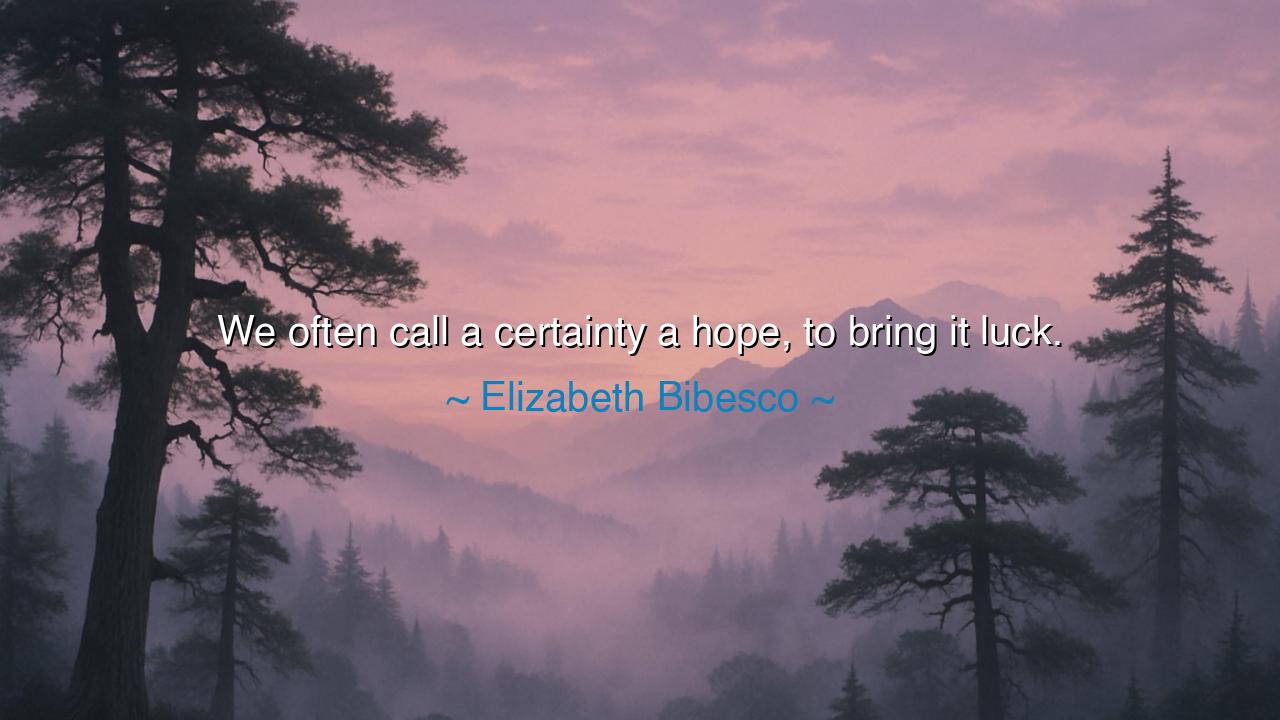
We often call a certainty a hope, to bring it luck.






In the delicate yet profound words of Elizabeth Bibesco, the poet and observer of human hearts, we find a truth both tender and timeless: “We often call a certainty a hope, to bring it luck.” These words, though simple in sound, unveil a deep paradox within the human soul — that even when we know something to be true, we cloak it in hope, as if to shield it from fate’s jealousy. Bibesco, who lived amidst the beauty and fragility of early twentieth-century Europe, understood that human beings are both creatures of reason and reverence. We fear to name our certainties too loudly, for we sense that life, in its mystery, punishes arrogance and blesses humility. Thus, we whisper “hope” even when our hearts already know the outcome — not from doubt, but from respect for the unseen forces that govern our days.
To call a certainty a hope is, in truth, an act of reverence toward the unknown. The ancients knew this well. They spoke softly of victory before the battle’s end, for fear that the gods might overhear and take offense at mortal confidence. In ancient Greece, generals would pray before war not for triumph, but for the possibility of it. To them, hubris — the sin of certainty — was a danger greater than defeat. Elizabeth Bibesco’s words echo this same humility: that to declare something as “certain” is to tempt fate, while to call it “hope” is to walk with gratitude and grace. Even in our modern age, when we trust science and strategy, there remains in us an ancient instinct to protect our blessings by veiling them in the soft fabric of hope.
Bibesco’s origin in both aristocracy and art gave her a keen sense of life’s fragility. Born into privilege and married into influence, she nevertheless lived through the chaos of a world at war and a civilization in flux. Her reflections often carried the bittersweet tone of someone who had seen beauty touched by sorrow, success shadowed by uncertainty. In saying that we “call a certainty a hope,” she reveals not superstition but wisdom — the awareness that the future, no matter how near, is never fully ours. It is her way of saying: Even in our confidence, let there be humility; even in our knowledge, let there be wonder.
History, too, bears witness to this truth. Consider the story of Thomas Edison, who once said, “I have not failed, I’ve just found 10,000 ways that won’t work.” Each time he neared success, he called it “hope” — though his genius and persistence made success almost certain. He clothed his confidence in hope not because he doubted, but because he respected the delicate balance between man’s effort and destiny’s will. Edison’s humility before his own certainty protected him from despair and invited inspiration to remain with him. In this way, hope became his charm, his talisman against arrogance and discouragement alike.
This quote also reminds us of the psychological grace of calling our certainties “hopes.” To do so is to remain open, to keep wonder alive in the heart. The moment we declare something certain, we close the door on surprise, on gratitude, on awe. Hope, by contrast, keeps the spirit alive — it allows us to experience joy as a gift, not a guarantee. To “bring it luck,” as Bibesco says, is to infuse the moment with reverence, as though saying, May this blessing endure, may it not slip away through my pride. In this way, hope becomes a kind of quiet prayer — a gesture of humility before the mystery of existence.
There is also tenderness in Bibesco’s insight. She understood that we fear loss most when we love deeply. When a mother says, “I hope my child will come home safely,” she does not mean she doubts it; she says it to guard her certainty with gentleness. When lovers say, “I hope we’ll be together forever,” they speak not from uncertainty, but from devotion. In such moments, hope is not weakness but love’s protective charm — a way of expressing faith without presumption. It is the human way of balancing joy with humility, certainty with surrender.
Let this be the lesson for those who walk the path of hope: never take your blessings for granted, nor proclaim your victories as if you alone earned them. Call your certainties “hopes,” not to deceive yourself, but to honor the delicate dance between your will and the will of the universe. Speak of your dreams with humility, for what is given can be taken, and what is certain can change in a breath. Yet do not fear this truth — embrace it. For to live this way is to live with gratitude, with wonder, with reverence for life’s unpredictability.
And so, my children, remember the wisdom of Elizabeth Bibesco: that in the sacred language of the heart, hope is both shield and blessing. When you are sure, still whisper gratitude; when you have achieved, still speak softly. For by calling your certainties “hopes,” you invite grace to stay beside them. In this way, your life will not only be full of success, but full of wonder — and in every triumph, you will find the humility that keeps it blessed.






AAdministratorAdministrator
Welcome, honored guests. Please leave a comment, we will respond soon